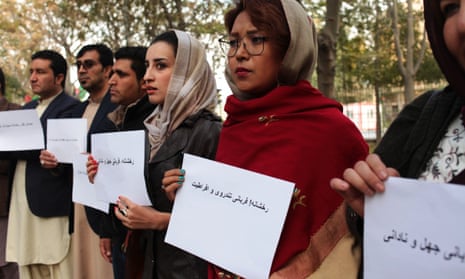In Afghanistan, a string of vicious murders this year has led to a public furore and protests, energising the national women’s rights movement.
However the movement still faces major challenges as women battle cultural norms within Afghanistan. The Taliban has also gained ground and intensified its persecution of women’s rights activists, endangering their hard-won gains of the past 14 years.
In March, a mob of men lynched 27-year-old Farkhunda in Kabul. Last month, a group of men stoned a 19-year-old woman, Rokhshana, to death in Ghor. And most recently, militants in the south beheaded seven ethnic Hazaras, including two women and a small girl.
The incidents triggered protests in the capital, after women carried coffins of the dead through the streets, and demanded government protection. “There was a momentum in the women’s movement even before the death of Farkhunda and Rokhshana. But their deaths seem to be a galvanising force,” said activist Massouda Jalal, a former minister for women’s affairs.
Yet even as activists have shown remarkable public courage, the Taliban has forced many to flee their homes amid fears that the government is unable to provide the protection offered by international donors and armies since 2001.
Immediately after seizing the northern city of Kunduz in September, Taliban fighters went from house to house, hounding government and civil society workers. The women who fled included female shelter employees, school administrators and journalists, hidden by the dark of night or in burqas, depriving the city of many resourceful women, whose presence is crucial for lasting peace and democracy.
Among them was Hassina Sarwari, Kunduz director for Women for Afghan Women, an organisation that ran a women’s shelter and a centre for children of female prisoners.
“I had fled to Takhar province when a man called and introduced himself as head of Amr bil-Maroof,” a Taliban department for religious observance, she said. “He said, ‘Your killing is wajeb ul-qatl’,” meaning “sanctioned by Islam”. The Taliban burned the charity’s shelter, and looted and destroyed its offices, Sarwari said.
Nazari, another activist, was still in the city on the third day of the siege, hiding in a neighbour’s basement, while her husband protected the family’s home. “The Taliban came to our house and asked for me,” Nazari said. “When they realised he was my husband, they killed him with a bullet to the forehead.”
Nazari fled to Kabul with her eight children but returned to Kunduz because she could not find work in the capital. She is now waiting for her NGO’s offices to reopen. “My husband was my everything,” she said. “How can I feed my family?”
Members of the Taliban told the Guardian that accusations against them were government propaganda.
Zabiullah Mujahed, the group’s official spokesman, admitted the Taliban in Kunduz had carried out house-to-house searches, but said they had been looking for government intelligence officers, of whom they had found and killed eight.
If the Taliban were to take power, he said, women’s activists could continue to work. “If they make things better for women but don’t work against Islam, then we don’t have a problem,” he said. “On one condition – they need to be independent. Now, they take money from embassies.”
However, Shahed, a Taliban commander in Chardara outside Kunduz city, was less conciliatory. “[Over] the past 14 years, the foreigners have spread awareness of equality in Afghanistan,” he said. “Women going to parliament, working as women’s representatives, they have been trained by the infidels and they are not following the rules of sharia [law],” he said.
“First, we tell them to stop things that are against sharia. If they don’t, we take other measures, and we do jihad against them,” he said.
Fighting their way into Kunduz, the Taliban gathered support from some residents who provided names of civil society members, said Sayed Rahim Mosavi, an activist. “Kunduz is a small place, and the work of civil activists was very clear to everyone,” he said.
Mosavi fled Kunduz, airlifted on a UN flight. Recently, he gathered with fellow activists in Kabul’s Zarnegar Park, in a protest against the brutal stoning of Rokhshana, accused of adultery.

Drawing about 50 people, the gathering was significantly smaller than protests that followed the murder of Farkhunda in March. The struggle for women’s rights is still far from mainstream.
In a speech, activist Humira Saqib lamented “the silence of the community”. She said the government “talks well” but had done little to protect the rights of women.
Meanwhile, insurgents are not the only threat to Afghan women. The Taliban did not kill Farkhunda, and neither is it clear that they murdered Rokhshana. The future struggle for women’s rights requires community action.
“Culture is one of the hardest challenges. As long as society supports violence and lawless acts, civil rights activists will be banging their heads against the wall,” said Jalal, the former minister.
“The death of Farkhunda and Rokshana are not about just women’s rights. It is about human rights and the inability of the government to enforce the rule of law,” she said.
- Additional reporting by Mokhtar Amiri
